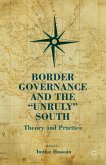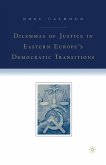Europe's Border Crisis investigates dynamics in EU border security and migration management and advances a path-breaking framework for thought, judgment, and action in this context. It argues that a crisis point has emerged whereby irregular migrants are treated as both a security threat to the EU and as a life that is threatened and in need of saving. This leads to paradoxical situations such that humanitarian policies and practices often expose irregular
migrants to dehumanizing and lethal border security mechanisms. The dominant way of understanding these dynamics, one that blames a gap between policy and practice, fails to address the deeper political issues at stake and ends up perpetuating the terms of the crisis.
Drawing on conceptual resources in biopolitical theory, particularly the work of Roberto Esposito, the book offers an alternative diagnosis of the problem in order to move beyond the present impasse. It argues that both negative and positive dimensions of EU border security are symptomatic of tensions within biopolitical techniques of government. While bordering practices are designed to play a defensive role they contain the potential for excessive security mechanisms that threaten the very
values and lives they purport to protect. Each chapter draws on a different biopolitical key to both interrogate diverse technologies of power at a range of border sites and explore the insights and limits of the biopolitical paradigm. Must border security always result in dehumanization and death? Is
a more affirmative approach to border politics possible? Europe's Border Crisis sets out a new horizon for addressing these and related questions.
Hinweis: Dieser Artikel kann nur an eine deutsche Lieferadresse ausgeliefert werden.
migrants to dehumanizing and lethal border security mechanisms. The dominant way of understanding these dynamics, one that blames a gap between policy and practice, fails to address the deeper political issues at stake and ends up perpetuating the terms of the crisis.
Drawing on conceptual resources in biopolitical theory, particularly the work of Roberto Esposito, the book offers an alternative diagnosis of the problem in order to move beyond the present impasse. It argues that both negative and positive dimensions of EU border security are symptomatic of tensions within biopolitical techniques of government. While bordering practices are designed to play a defensive role they contain the potential for excessive security mechanisms that threaten the very
values and lives they purport to protect. Each chapter draws on a different biopolitical key to both interrogate diverse technologies of power at a range of border sites and explore the insights and limits of the biopolitical paradigm. Must border security always result in dehumanization and death? Is
a more affirmative approach to border politics possible? Europe's Border Crisis sets out a new horizon for addressing these and related questions.
Hinweis: Dieser Artikel kann nur an eine deutsche Lieferadresse ausgeliefert werden.








